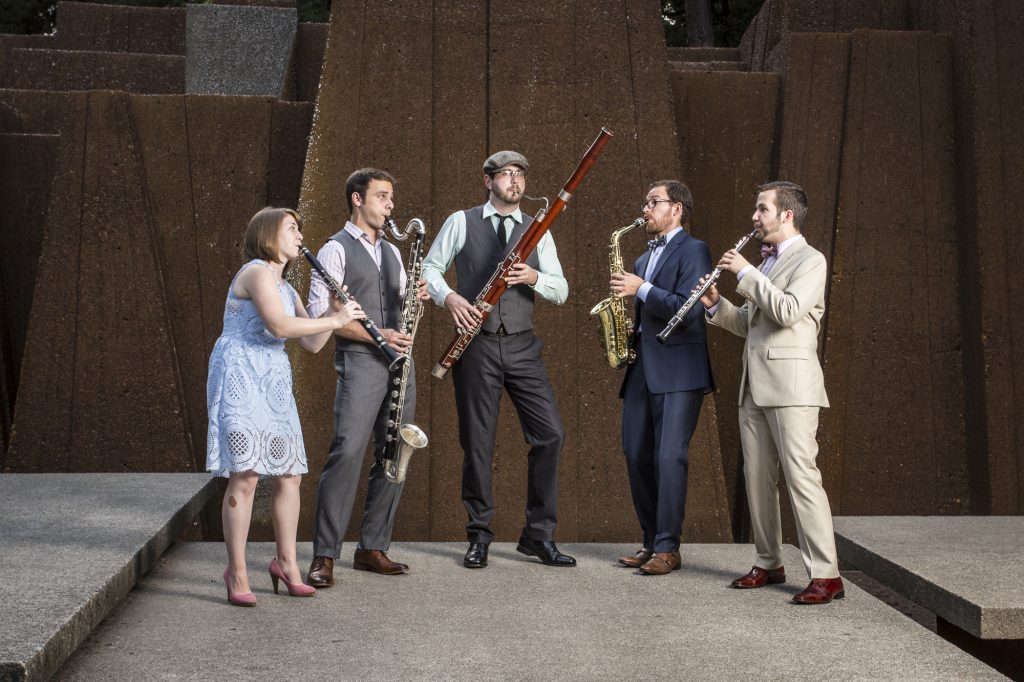
The usual round of chamber music visits to South Florida in season favors assemblies of string instruments, sometimes with piano, and the occasional woodwind quintet.
That’s part of what made the Feb. 19 concert by the Akropolis Reed Quintet at the Flagler Museum so special: Unlike a standard wind quintet of flute, oboe, clarinet, horn and bassoon, the Akropolis has oboe (doubling on English horn), clarinet, alto saxophone (doubling on soprano), bass clarinet and bassoon. The result is a sound that’s closer to the one Adolphe Sax might have been thinking of for his family of saxhorns, dark, very reedy and quite powerful.
This is a genial bunch of young musicians, based in Michigan where they were founded a decade ago, and they are all excellent instrumentalists. They had to be, to pull off with such seeming ease the difficulty of their program, and in the cases of the transcriptions that made up much of the concert, to make the music sound as though it might have been written for this combination in the first place.
Two cases in point were the opening and closing works, Kurt Weill’s Threepenny Opera suite and George Gershwin’s An American in Paris, respectively. Both were brilliantly arranged for this combination by the contemporary Dutch saxophonist and composer Raaf Hekkema. In the Weill operetta, the composer created a stripped-down sound for a small pit band that will forever be associated with the artistic ferment of the Weimar Republic, and in this even smaller ensemble, of course, that purposeful miniaturism came through.
But that does not mean the Akropolis sounded tinny or tiny. Aided by the generous acoustic of the Whitehall music room, the quintet offered a rich, smooth sound that belied its size. Themes, such as the familiar “Mack the Knife,” were handed off between the musicians with such polish and uniformity of approach that it was hard to tell at first which of the instruments was playing it. And while their sound was somewhat softer than what you’d get with some percussion in the mix, the quintet missed none of the wit and bite of Weill’s aesthetic.
Breath control was impressive and dynamics were scrupulously observed, very much in the manner of a veteran string quartet that has worked out every color and accent it wants to bring to its program. Standing in a semi-circle, the members of the Akropolis bobbed and weaved with the music, making frequent eye contact with each other. They looked as though they were having a wonderful time; those of us who were band musicians in secondary school could only look on with envy.
Hekkema’s treatment of Gershwin’s 1931 tone poem was no less imaginative and deft, though in the opening bars, something is missing without the woodblocks and the car horns; stripped of its string complement, this piece sounded quite French, with the exception of the famous slow blues tune in the middle, here played warmly on English horn by Tim Gocklin. Here again, details of interpretation were numerous and executed beautifully, which added colors to the quintet’s overall sound that you would not expect to be there otherwise. The result was a fine and engaging reading of this classic piece of musical tourism.
Three other works were on the program, including a very aggressive arrangement of Astor Piazzolla’s Libertango in which the music sounded almost distorted, and the quintet unloaded a huge amount of sound at the end. It was striking if not particularly uplifting, given the mediocrity of the original piece, but the Whitehall audience loved it.
The other two pieces were commissioned for the quintet from young American composers. One of them was Nico Muhly, whose career has soared into the top echelons thanks in part to his prolific output and his high-profile operatic work, including Marnie, an adaptation of the Hitchcock film that played the Metropolitan Opera earlier this season. His piece for the Akropolis, Look for Me, is of a piece with much of his music; based on the spiritual “Mother in the Graveyard,” it’s slow, pretty and inoffensive, but it doesn’t have much urgency or profile, though the quintet played it with great tenderness.
More interesting was Refraction, a three-part work by David Biedenbender, a professor at Michigan State who wrote the work in 2015, the same year Muhly wrote his. It begins with a short movement called “Death Metal Chicken,” in which the bass clarinet (Andrew Koeppe) and bassoon (Ryan Reynolds) play a repeated chugging modal chord figure much like the E minor guitar warriors of metal might, underneath a quirky series of high-pitched random chords in the other instruments.
The finale, “Goat Rodeo,” which the composer describes as a “strange mashup of dubstep, funk and musical pointillism,” doesn’t suggest any of those things particularly. But it is an effective depiction of something chaotic going on, and the Akropolis made that clear while also maintaining strict control of the proceedings.
But it was the second movement, “Kyrie for Machaut and Pärt,” that made the strongest impression. Koeppe and clarinetist Kari Landry walked behind the curtain at the back of the performance space to play notes like muezzin calls in counterpoint with Gocklin’s oboe. Toward the end of the movement, the music took on the feel of the Flemish and Estonian masters to whom it is dedicated; the frequent appoggiaturas in the movement also evoked the Carnatic music of India that Biedenbender admires and studies. All of this was played with great skill and a wide-open kind of beauty.
It would mark a signal achievement if the Akropolis Reed Quintet were able to witness the establishment of a number of groups with the same instrumentation. They made a most persuasive case for it in the Flagler series, and one hopes to see them return with all possible speed to the South Florida musical season.